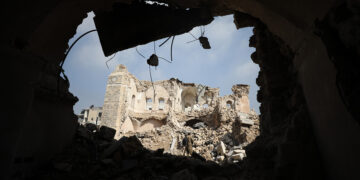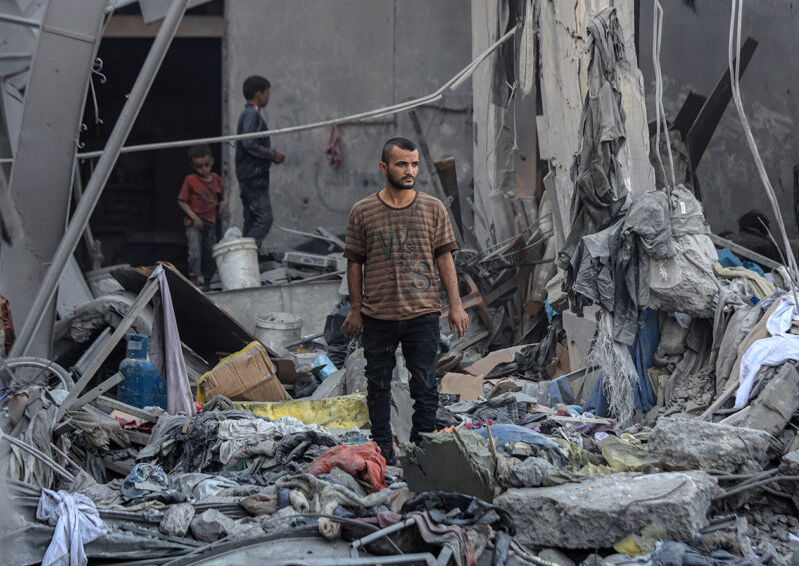“No Way But Forward is about humanity, how it continues to grow, how people actually live . . . [It is] an urgent, vital and precious life’s work that needs to be read by as many people as possible.”
JANINE DI GIOVANNI, award-winning author and journalist
“A poignant labour of empathy and dedication to truth. It will be a classic on Gaza . . . Historically, a priceless record of a Gazan era obliterated since Oct 7 and a worthy memorial to it.”
WALID KHALIDI, author of From Haven to Conquest
“A work of immense beauty and humanity, an unassailable refutation of the dehumanization and unseeing to which Palestinians have always been subject. Absolutely essential . . . a gem.”
SARA ROY, author of The Gaza Strip
“No Way But Forward is a remarkable achievement . . . Brian Barber reveals how we continue to survive; he shows our happiness, our sorrow, and what we dream.”
YASSER ABU JAMEI, Gaza Community Mental Health Centre
“Brian Barber’s tender witnessing of these extraordinary lives provides a window into a world of suffering and survival that few of us would have the privilege to know without his dedication and profound service to these friendships.”
ELIZA T. GRISWOLD, Pulitzer Prize Winning Author and Poet
“No Way But Forward is hard to put down . . . Barber succeeds in illuminating the daily experiences and emotions that transcend the boundaries of geography and culture . . . a wrenching lens that lays bare the simple truth of our common humanity.”
ANNE-MARIE SLAUGHTER, author of Renewal
“Barber shares with us [his protagonists’] determination to live in dignity, to fulfil their aspirations for family life and, above all, for freedom. A beautiful, deeply moving, and essential book.”
AVI SHLAIM, author of Israel and Palestine
“In his detailed narrative of three families courageously persevering . . . Brian Barber has captured the essence of my story and that of all two million plus citizens of Gaza.”
AHMED ALNAOUQ, co-author of We Are Not Numbers
“No Way But Forward brings us into the intimate homes of the protagonists, calls on us to share every moment of joy and sorrow, every victory and loss, every aspiration and disappointment . . . We become one with them.”
TAREQ BACONI, author of Hamas Contained
“Brian Barber’s book, No Way but Forward, may be the best book written about Gaza in modern times. Gaza adopted the Phoenix as its symbol because it always rises after death. Barber’s writings give new life to this ancient place.”
MAHMOUD DAHER, former Head of WHO Office in Gaza
“Brian Barber has spent more time on the ground in Gaza than almost any outside observer . . . If you are trying to understand what life is like for ordinary Gazans, this book is essential reading.”
PETER BERGEN, author of The Rise and Fall of Osama bin Laden
“A heart-rending and powerful book . . . opens our eyes and hearts to the grim realities of the life—and death—of Gazans . . .”
JEFFREY D. SACHS, author of A New Foreign Policy
“Barber’s goal was not to capture the moments of breaking news, but rather to describe the everyday lives of Gazans seeking to do the things that all humans desire . . . The world must see this book and the sooner the better. It grabbed me and hasn’t let go.”
HAROLD D. GROTEVANT, Emeritus Professor of Psychology
University of Massachusetts Amherst
“Barber’s book is both an invaluable window into pre–October 7th Gaza and an affirmation of the dignity of a society whose obliteration those of us fortunate enough to know Gaza now mourn.”
NANCY MURRAY, Gaza Mental Health Foundation
“Barber writes with a sensitive understanding of Gazan life . . . creating a clear picture of [the residents’] deep humanity and challenging the rhetoric of our times.”
ALICE ROTHCHILD, author of Condition Critical







